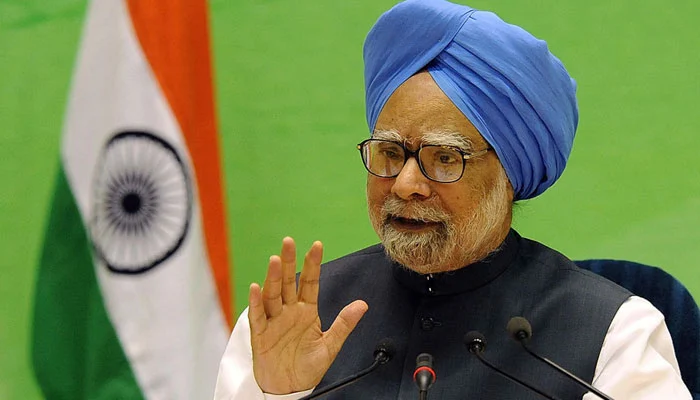Last Updated on December 27, 2024 2:15 am by INDIAN AWAAZ
ANDALIB AKHTER
Former Prime Minister Dr. Manmohan Singh, widely regarded as the architect of India’s economic reform,passed away on Thursday at the age of 92. Singh death has left an enduring impact on India’s political and economic landscape.
Singh was one of India’s longest-serving prime ministers and he was considered the architect of key liberalising economic reforms, as premier from 2004-2014 and before that as finance minister.
Early Life and Education
Born on September 26, 1932, in Gah, now in Pakistan into a poor family, Singh studied by candlelight to win a place at Cambridge University before heading to Oxford, earning a doctorate with a thesis on the role of exports and free trade in India’s economy.
He became a respected economist, then India’s central bank governor and a government advisor but had no apparent plans for a political career when he was suddenly tapped to become finance minister in 1991.
Singh pursued economics at Punjab University, where he earned his bachelor’s and master’s degrees. In 1957, he completed an Economics Tripos at Cambridge University and later received a DPhil in Economics from Oxford University in 1962. Singh was a professor at Punjab University and Delhi School of Economics before becoming Economic Advisor in the Ministry of Foreign Trade in 1971. He later served as Chief Economic Advisor in the Finance Ministry from 1972 to 1976.
Role at the Reserve Bank of India
Singh served as the Governor of the Reserve Bank of India from September 1982 to January 1985. During his tenure, Singh was also a member-secretary of the Planning Commission from 1980 to 1982 and its deputy chairman from 1985 to 1987.
Singh also served as Secretary-General of the South Commission in Geneva from 1987 to 1990. He held positions such as Advisor to the Prime Minister and Chairman of the University Grants Commission.
A Revolutionary Finance Minister
Singh rose to political prominence as India’s finance minister in 1991, taking over as the country was plunging into bankruptcy.
His unexpected appointment capped a long and illustrious career as an academic and civil servant – he served as an economic adviser to the government, and became the governor of India’s central bank.
In his maiden speech as finance minister he famously quoted Victor Hugo, saying that “no power on Earth can stop an idea whose time has come”.
Appointed Finance Minister in 1991 under Prime Minister P.V. Narasimha Rao, Singh steered India through one of its most severe economic crises. Amid a balance-of-payments crisis, Singh introduced sweeping reforms such as rupee devaluation, tax restructuring, and the removal of trade barriers. These measures unlocked foreign investments and laid the foundation for India’s rapid economic growth.
The reforms marked a turning point, opening India’s economy to the global market and transitioning the country into an era of economic dynamism. Singh’s tenure as Finance Minister was celebrated for breaking new ground and stabilising India’s fiscal health.
Parliamentary Career
Singh was elected to the Rajya Sabha from Assam in 1991 and served as an MP until 2004. From 1998 to 2004, Singh served as the Leader of the Opposition in the Rajya Sabha.
Following Congress’ victory in the 2004 Lok Sabha elections, Singh became the first Sikh Prime Minister of India. He served two consecutive terms, taking the oath of office on May 22, 2004, and May 22, 2009.
Re-elected in 2009, his second term was marred by challenges such as inflation, corruption scandals, and administrative inefficiencies. Despite these hurdles, his government introduced landmark policies, including legislation guaranteeing citizens access to food, education, employment, and information. His tenure also consolidated India’s position as a global economic power.
‘Accidental PM’
The formation of the UPA by the Congress in 2004, under the leadership of Sonia Gandhi, was met with opposition from various parties, including the Bharatiya Janata Party (BJP) and the Shiv Sena. This opposition resulted in Sonia Gandhi declining the prime ministerial post, creating a power vacuum within the alliance.
Questions regarding Sonia Gandhi’s citizenship were raised by her opponents, further complicating her potential appointment as prime minister. In response to the protests against her, Sonia Gandhi chose to step aside and nominate another individual for the role.
The UPA faced challenges in finding a suitable candidate to lead the alliance, eventually settling on veteran leader Manmohan Singh. With a background in economics and previous experience as finance minister, Singh emerged as the consensus choice for the prime ministerial role.
In an interaction with a daily newspaper years after his term as the prime minister was over, Singh once said: “I have nothing to be ashamed of about my prime ministership.”
During the latter part of his second term as Prime Minister in 2014, Singh expressed his belief that he would be remembered more favorably by history than by the media. This statement came amidst criticism labeling him as a “weak PM,” with Sonia Gandhi being recognised as the driving force behind his leadership during his two terms in office.
Awards and Recognitions
Singh was honored with several awards during his career, including the Padma Vibhushan in 1987, the Euro Money Award for Finance Minister in 1993, the Asia Money Award for Finance Minister in 1993 and 1994, and the Jawaharlal Nehru Birth Centenary Award by the Indian Science Congress in 1995.

